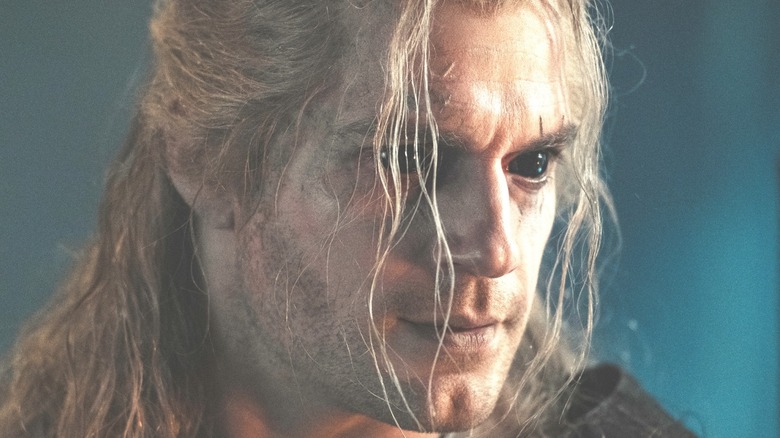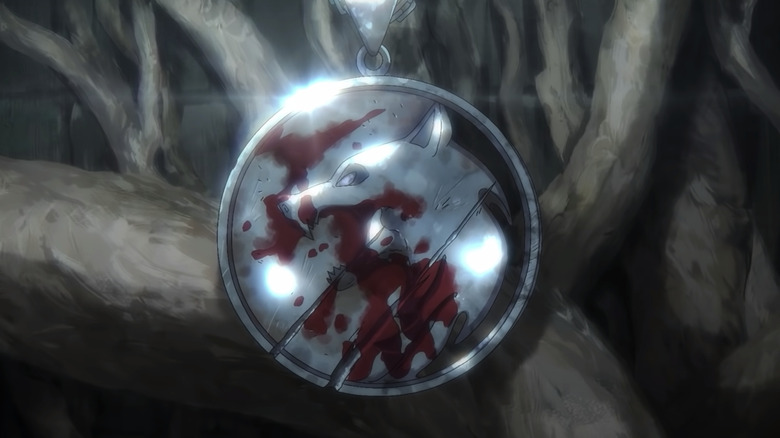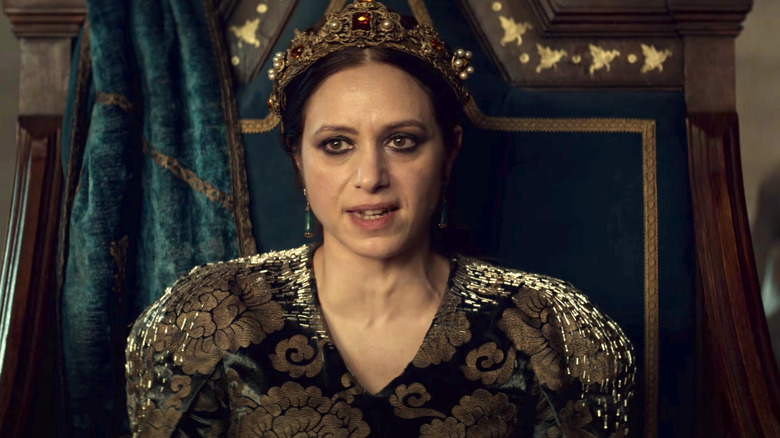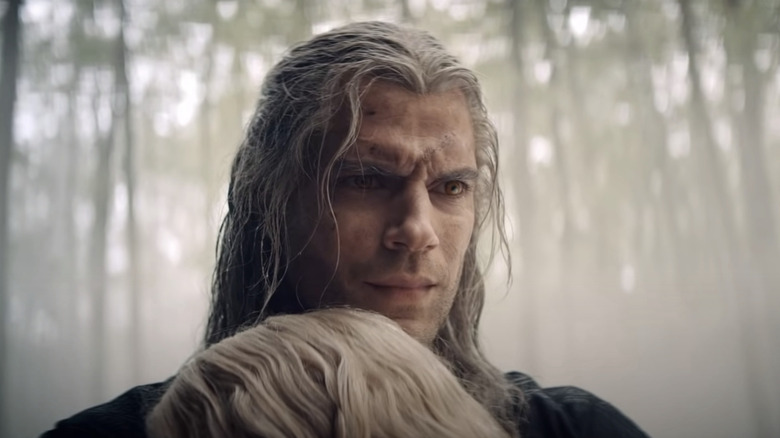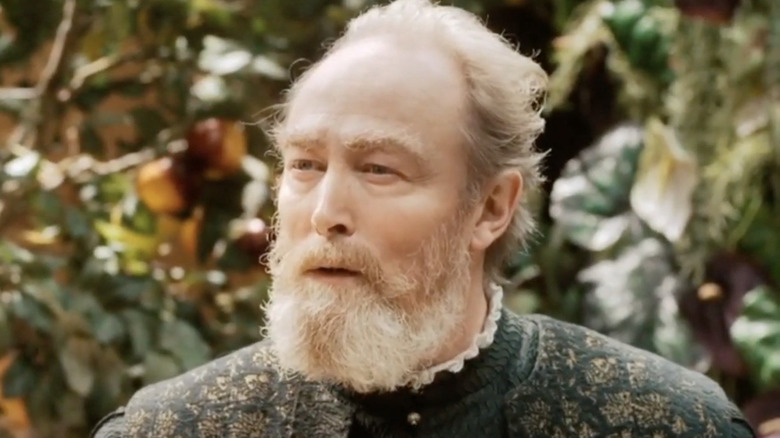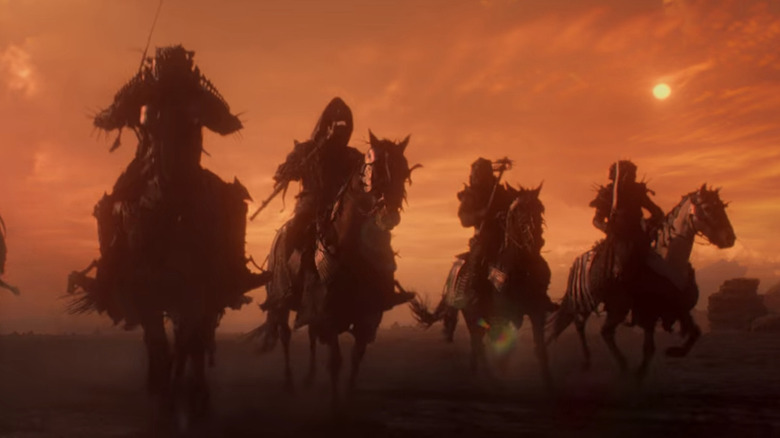Lines In The Witcher Season 2 That Mean More Than You Realize
Contains spoilers for "The Witcher" Season 2
Season 2 of "The Witcher" finally landed on Netflix on Friday, December 17. It's been a long time coming for fans who have been waiting eagerly for the arrival of a new season, which debuts two years after Season 1. Some viewers may be relieved that the new season has dropped the multiple timelines of Season 1, with all of them eventually coming together in the finale episode. They'll also likely be excited to dig into this thrilling next chapter, where even more essential history from "The Witcher" world is introduced, as are plenty of enemies and monsters.
Now, "The Witcher" is all caught up to the present time and it's sticking close to the protagonists of the series: Geralt of Rivia (Henry Cavill), Princess Cirilla, aka Ciri (Freya Allan), and Yennefer of Vengerberg (Anya Chalotra). The story is a bit more straightforward in Season 2. As teased by the trailer for this season (via YouTube), the plot mainly follows Geralt's tutelage of Ciri at his old home of Kaer Morhen, while Yennefer finds herself to be a prisoner of war.
While Season 2 is less complicated than the first, there are still some things that fans should keep an eye out for. The mythology is heavily increased, and Witcher mutagens are introduced as well as a brand new class of monster. Fans should listen closely to the dialogue as well because some lines are so important, they may require you to rewind and listen again.
Kaer Morhen has a lengthy history
"There was an attack. A long time ago, when I was a boy. Almost wiped us all out. So now we like to keep a low profile."
As fans may know well by now, Geralt is not known for being particularly forthright. For this Witcher, less is always more. He takes Ciri to the Witcher stronghold, Kaer Morhen, knowing that it will keep her safe. Upon their approach, Ciri notes its rundown appearance. He offers an explanation, but not a very in-depth one. The sacking of Kaer Morhen is devastating for Witchers, and it's detailed in the anime film "The Witcher: Nightmare of the Wolf." The Netflix film covers Vesemir's (voiced by Theo James) backstory. In his youth, he dreams of escaping his misfortune, and he goes on to become a Witcher and kill monsters for coin.
In addition to this backstory, "Nightmare of the Wolf" details the specifics of the downfall of Kaer Morhen. It includes themes that are familiar to "The Witcher." Prejudice is rampant, with many people on The Continent despising Witchers for being mutants. A powerful mage named Tetra (Lara Pulver) blames Witchers for the deaths of her family and comes up with a plot to destroy them. This plan includes destroying mutagens, which results in the loss of any means to create more Witchers. This backstory gives more context to Vesemir's grief over losing Ciri's blood compound that would have made more of his kind.
Prejudice touches more than one life
"Your grandmother didn't want [your mother] marrying ... an outsider."
Part of Ciri's great loss is that she never knew her parents. As we see in Season 1, The Law of Surprise (via Vulture) ensures that, even though Geralt initially balks at the idea, Ciri's destiny is forever tied to his, and he is responsible for her. Ciri's birth parents are removed from the picture the moment Geralt helps her father, Duny (Bart Edwards), secure Duny's union with Ciri's mother, Pavetta (Gaia Mondadori). However, Ciri was first raised by her grandmother, Queen Calanthe (Jodhi May), who kept the details of her lineage and fate a secret from her.
Geralt reveals to her that he was at her parents' wedding feast, causing Ciri to be intrigued because she has very little knowledge about how her parents came to be wed. Geralt never sugarcoats the truth, but he does leave specific details out. He tells Ciri that her grandmother didn't approve of the marriage but is lighter on the details, like her mother falling in love with her father while he was cursed to look like a hedgehog.
Geralt does this as a kindness, not wanting to sully Ciri's perception of her grandmother. But he is careful for another key reason. He knows exactly what it means to be an outsider. Going through life, he experiences judgment from the world at large for being a Witcher. He knows the pain that brings and what it is like to remain on the outside.
Geralt experiences the pain of fatherhood
"If it were your child, you'd be going crazy to figure it out. What you missed. What you could have done differently."
Being a parent is a core theme of "The Witcher" Season 2. Until now, Geralt spent most of his life alone, only having to care for himself and his horse, Roach. Parenthood — albeit surrogate fatherhood — is new to him, and he doesn't always do the right thing. When Geralt and Ciri travel to Kaer Morhen, Vesemir (Kim Bodnia) advises him on the truths of being a parent. Geralt often expects Ciri to do as she's told and quickly realizes that raising a child is not as easy as bending a child to one's will. He learns this especially after the death of his brother-in-arms, Eskel (Basil Eidenbenz). Eskel is infected by a Leshen and turned into a monster. After Geralt is forced to kill him, Vesemir laments the loss. The Witchers at Kaer Morhen are like sons to him, and his grief is powerful.
At the time, Geralt feels like he can sympathize with Vesemir's emotions. He is a father of sorts now and would do anything for Ciri. But he doesn't fully understand the overwhelming weight of parenthood until later. After bringing Ciri to a temple so she can learn to control her chaos, he reunites with Yennefer. Though the reunion is romantic at first, Geralt quickly learns his mistake in trusting her. Yennefer steals Ciri in a bid to reinstate her power. Geralt is not especially surprised at Yennefer's actions but feels the heartache of losing someone who is effectively his child.
Stregobor was always the worst
"I've always tried to protect our institutions. To protect you."
Stregobor (Lars Mikkelsen) is easily one of the most detestable antagonists in "The Witcher." He operates with no morals, asking Istredd (Royce Pierreson) to spy on Yennefer due to her elven blood in Season 1. He makes no show of hiding his prejudices and outwardly hurts people for his own enjoyment. This includes his treatment of Yennefer in Season 2. Because she is a quarter elf, Nilfgaard's alignment with the elves calls her loyalty into question. Fueled by suspicions she is a spy, Stregobor tortures her, trying to enter her mind for secrets. He defends his actions by stating that all he ever cared about was protecting their society.
But this is a weak defense. Stregobor has often exhibited hatred of women. He refers to Yennefer as being lesser because of her blood. This attitude is a mirror from Season 1 and his treatment of Renfri. One Renfri detail is that she was among 60 girls born during a lunar eclipse. Because of this, Stregobor decreed that they should all be killed. Renfri suffered at the hand of Stregobor, and his abuses continued into the present timeline. He uses the excuse that he is doing it for his people when he is really just prejudiced.
The Wild Hunt is coming
"Where those the Wraiths of Mörhogg?"
Many plot points have been teased and built up since the first episode of "The Witcher" series. However, an element that fans of the show may not be familiar with materializes in the final episode. After Ciri, Geralt, and Yennefer dispel Voleth Meir in a parallel sphere, the newfound family sees something they did not expect: A horde of ghostly riders charges them before Ciri portals Geralt, Yennefer, and herself back to safety. But Ciri knows they aren't completely safe yet.
Geralt confirms her suspicions, merely saying those riders are The Wild Hunt, also known as The Wraiths of Mörhogg. They have seen Ciri and, like many, felt her power. Though only mentioned briefly, The Wild Hunt will be integral to "The Witcher" world going forward. The ghost riders are set up in Andrzej Sapkowski's books and are heavily featured in "The Witcher 3" video game (via PC Gamer). These riders are intent on capturing slaves, and they mark Ciri as their next target. Her Elder blood draws them to her and makes her desirable because of how powerful she is.
The introduction of The Wild Hunt is only the start of the plotline involving this terrifying antagonist from "The Witcher" canon. Ciri and her new family will have to look out for it in Season 3.
